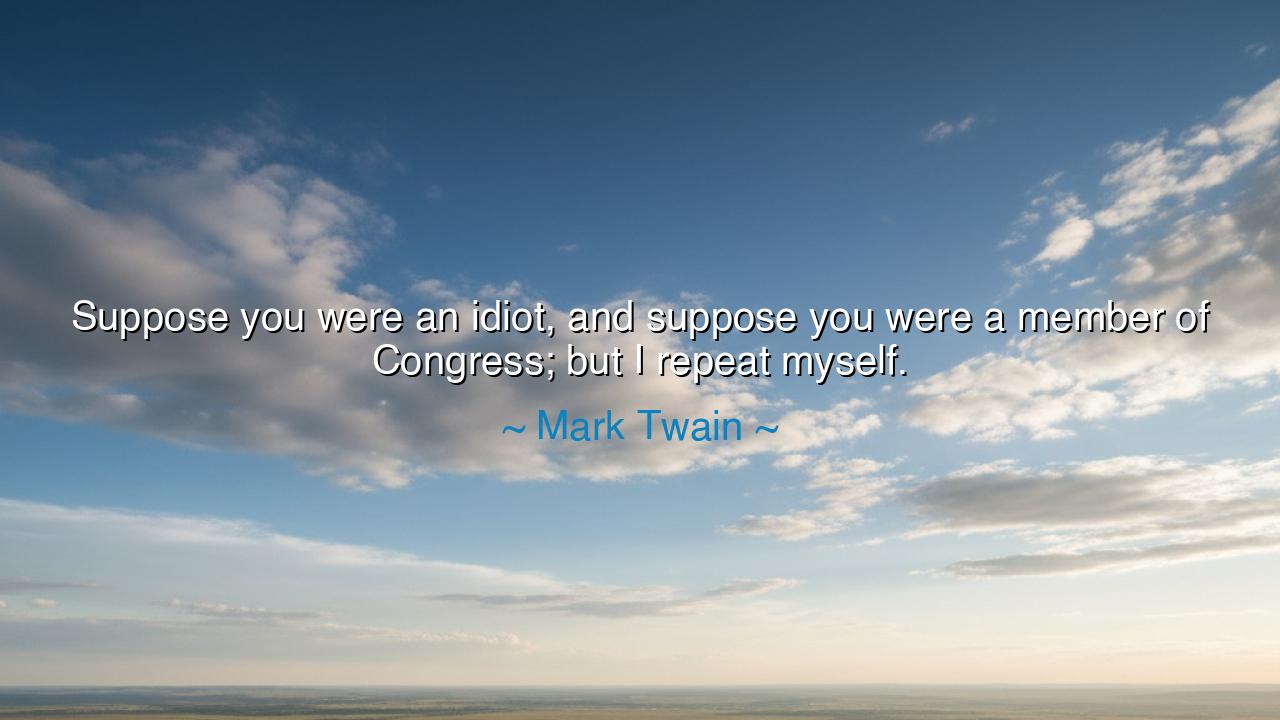
Suppose you were an idiot, and suppose you were a member of
Suppose you were an idiot, and suppose you were a member of Congress; but I repeat myself.






In the words of Mark Twain, “Suppose you were an idiot, and suppose you were a member of Congress; but I repeat myself.” we hear the timeless sting of satire sharpened into a blade. Twain, master of irony and scourge of human folly, here joins two insults into one—fools and lawmakers—and declares them indistinguishable. His words reveal both frustration and jest, a bitter recognition that those entrusted with the highest offices of power often act with the shortsightedness of children. The quote is not merely a jest against politics, but a mirror held up to the recurring incompetence of governance.
The origin of this saying lies in Twain’s lifelong skepticism of authority and his sharp disdain for corruption in American politics. Living in the Gilded Age, Twain saw Congress marred by greed, bribery, and waste, an institution that seemed to serve itself more than the people. It was a time when moneyed interests twisted the laws of the land, and public servants too often became servants of power. With his unrivaled wit, Twain condensed this grim truth into a single sentence—mocking not just individual politicians but the system itself, which seemed to breed idiocy as surely as it produced legislation.
History gives us countless examples that prove his point. In the years after the Civil War, the Crédit Mobilier scandal revealed members of Congress who had enriched themselves in schemes tied to the railroads, selling out the public trust for personal gain. Later, during the Great Depression, dithering lawmakers failed to act swiftly while millions starved. Time and again, the people’s representatives faltered, showing folly in moments where wisdom was most needed. Twain’s jest becomes prophetic: to call a man a congressman was, too often, to call him a fool.
The deeper meaning of this quip, however, is not mere cynicism—it is a warning. Twain reminds us that power does not guarantee intelligence, and that institutions of governance, if left unchecked, can become breeding grounds for incompetence. The insult of “idiot” is not just about lack of wit, but about lack of integrity, of foresight, of courage. A fool in private life harms only himself; a fool in Congress may harm millions. Thus, Twain’s humor cuts like thunder, for beneath the laughter is the sorrow of a republic betrayed by its own guardians.
Yet, do not mistake Twain’s words as hopelessness. He was, in his way, a democrat of the highest order, believing that the people must always question those who govern them. His humor was not meant to destroy faith in democracy, but to stir vigilance, to awaken the citizen to the dangers of blind trust. By calling Congress a collection of fools, he challenges the people to demand better, to hold their representatives accountable, to remember that true power lies not in marble halls but in the hands of the governed.
The lesson for us, O listener, is stern and unchanging: never assume that those in power are wise simply because they hold office. Do not mistake the trappings of authority for the substance of virtue. A man in fine clothes may still be an idiot, and a woman behind a gilded desk may still serve only herself. Therefore, as citizens, we must be discerning, questioning, and relentless in our demand for honesty and competence. If we fail in this duty, we will be governed by fools and have only ourselves to blame.
As for practical action: learn the issues of your time, examine the words and deeds of those who represent you, and vote with both memory and vision. Do not be lulled by empty speeches, but measure leaders by the fruits of their labor. And when you find corruption or incompetence, do not laugh only, but act—through your voice, your vote, and your vigilance. For while Twain’s jest will always echo in the halls of history, it is within our power to make it less true.
Thus, Twain’s words endure as both jest and prophecy. “Suppose you were an idiot, and suppose you were a member of Congress; but I repeat myself.” It is a reminder that folly in politics is ancient and enduring, but so too is the responsibility of the people. Laugh, yes, at the absurdity of it—but let that laughter rouse you to wisdom, so that the republic is not forever at the mercy of fools.






AAdministratorAdministrator
Welcome, honored guests. Please leave a comment, we will respond soon